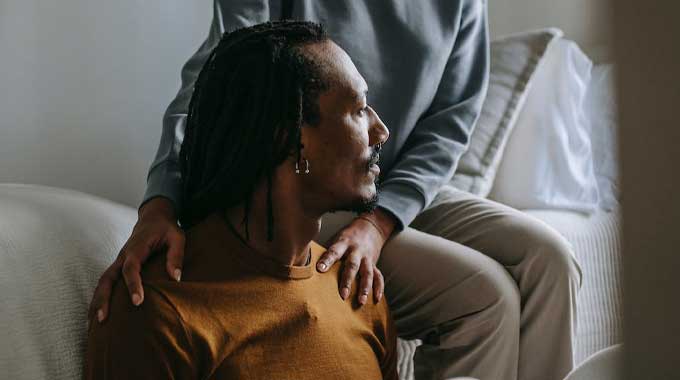Anxiety is a common human emotion that we all experience at times. After all, life can throw up some anxiety-producing situations. Feeling anxious when it is related to specific events such as a job interview, audition, or big life decisions is completely natural, and it can even provide beneficial functions by making us consider risks or consequences.
On the other hand, if significant anxiety symptoms inhibit a person’s ability to live a normal life, it could indicate they are living with a debilitating mental health condition.
If someone in your life is living with a form of anxiety, it can be painful to watch them in such distress. The good news is anxiety is a treatable condition, and there are things that you can do to help improve their situation.
In this blog, we look at how to help someone with an anxiety disorder, how you can offer support to them, and look after yourself through this time too.
1. Understand Their Condition
Anxiety disorders can be complex to identify, particularly given that some symptoms can be a normal part of life. There are several types of anxiety which manifest in different ways, and understanding the main features and unique aspects of each disorder can be extremely helpful.
There are six key forms of anxiety disorder, affecting approximately 47 million people in the United States.
These six disorders include the following:
- Generalized Anxiety Disorder
- Generalized anxiety disorder, also known as GAD, is a very common mental health condition experienced as persistent feelings of anxiety, worry, and stress, sometimes without clear triggers.Anxiety and Depression Association of America reports that this condition affects 6.8 million adults, around 3.1% of the American population, in any given year. Someone living with generalized anxiety disorder may feel anxious about things throughout the day, and worry may keep them awake at night.Someone living with GAD will find it very difficult to manage their anxious thoughts and it may manifest in physical symptoms. Somebody with GAD may experience other forms of anxiety or mood disorders such as depression.
- Panic Disorder
- Panic disorder is usually experienced with overwhelming and uncontrollable episodes of extreme panic, which are sometimes accompanied by physical symptoms. Somebody with panic disorder may be suddenly overcome with fear and experience symptoms such as shallow breathing and a rapid heartbeat. Somebody with this condition may become so anxious that they experience a panic attack.
- Post-traumatic stress disorder (PTSD)
- Post-traumatic stress disorder is a condition that can present after a person experiences trauma. If the body does not manage to process the traumatic event, the person may be left with symptoms of post-traumatic stress. This is a common condition in veterans, survivors of sexual or physical abuse and people who have experienced war or extreme violence. Symptoms of PTSD include graphic images and memories of the event, very low mood, anger, aggression, shame, or ‘survivors guilt’.
- Phobia disorders
- A phobia is characterized by an intense fear of specific things or situations. Many phobias may be founded on some form of realistic anxiety, such as a fear of spiders, needles, or flying, but the fear is not in proportion to the actual risk caused by the situation or thing.Somebody with a phobia will excessively worry about having to face their phobia, so much so that they may avoid situations where they could encounter it. If they are faced with their phobia, they are likely to experience intense fear and symptoms of anxiety.
- Social Phobia
- Social phobia is a form of anxiety that leaves people with feelings of significant anxiety and low self-esteem in social situations. Somebody with social phobia may choose not to socialize to protect themselves from feelings of stress, panic, low self-confidence, and judgment from others.
- Obsessive-compulsive disorder (OCD)
- Obsessive-compulsive disorder is characterized by two main features – obsessive thoughts and compulsive behaviors. Obsessions may be experienced as persistent rumination, which they use compulsive behaviors to manage. Part of OCD is feeling as though the compulsive behavior must be enacted, otherwise it may cause harm. Compulsions are repeated behaviors, such as blinking, counting, cleaning, hoarding, and repeating words or phrases.
All of the above anxiety disorders are likely to interfere with leading a normal life, having healthy relationships and taking on personal and professional responsibilities.
2. Educate Yourself on the Main Symptoms of Anxiety
The different categories of anxiety disorder have some significant features which distinguish them from each other, however, there is some overlap of symptoms.
In order to help someone with anxiety, familiarize yourself with the common anxiety symptoms and try to recognize when they are presenting. If you are unsure what condition your loved one is experiencing, seek advice from a mental health professional.
Physical signs of anxiety:
- Very fast heart rate
- Excessive perspiration
- Shaking
- Chest pains
- Lethargy or low energy
- Blushing
- Gastrointestinal issues
- Sleep problems
- Headaches or body pains
- Stiff and tense body posture
Emotional signs of anxiety:
- Intense feelings of foreboding
- Excessive worry
- Feeling a loss of control
- Agitation or restlessness
- Low self-confidence and lack of self-esteem
Behavioral signs of anxiety:
- Avoiding eye contact
- Difficulty controlling feelings of worry
- Having difficulty concentrating
- Being irritable
Additionally, someone with OCD or phobias will have specific symptoms related to their disorder.
3. Acknowledge Their Feelings
Living with anxiety can be extremely isolating, especially if the feelings and experiences of the person are dismissed. One of the most beneficial things you can do for someone with anxiety is to acknowledge their feelings and show them that you can see how it affects them.
This doesn’t always come naturally – it can be easy to dismiss your loved one’s feelings, or constantly try to reassure them there is nothing to be anxious about. This is only going to make them feel further isolated, make their anxiety worse, and they may stop looking to you for support.
When they are showing signs of anxiety, you can try gently saying, “I can see that this situation is causing you some anxiety and distress. Shall we try a meditation exercise, deep breathing, or do some grounding exercises together?”
4. Support them Compassionately
Showing a friend that you are there regardless of how they feel can be extremely beneficial. Often people struggling with mental health conditions feel as though they are burdening others if they are honest about how they feel.
However, just being present and yourself, whether they are feeling up or down, will assure them that they are supported. This doesn’t mean you need to fix their problems or offer solutions, it simply means offering a listening ear and allowing them to feel heard without making them feel judged.
5. Ask Specific Questions
For someone going through a period of mental illness, such as severe anxiety, understanding what they want and making decisions can be difficult. By asking clear questions, you can try to help them understand exactly what they feel, want, and need.
This also ensures that you aren’t doing things you ‘think’ will support them, but that in reality make your partner/friend feel uncomfortable. Be open, honest, and clear, this will encourage them to do the same.
6. Look After Your Own Well-being
Offering emotional support to a loved one experiencing anxiety can take its toll on you. It is natural to want to do everything you can, but it’s important to recognize your limits.
In order to help, you have to be emotionally strong yourself. This may mean stepping back at times, or acknowledging when things feel overwhelming. Practice your own self-care routines and make sure you continue to enjoy life in ways you usually would.
7. Learn About Holistic Treatments Together
Exploring holistic treatment options with someone who is struggling with anxiety can empower them to improve symptoms without medication. There are a number of techniques that can help an anxious person manage their feelings and get on with their daily life.
- Reduce caffeine intake – try switching to herbal teas
- Incorporate mindfulness meditation practice into everyday
- Practice relaxation techniques – perhaps with essential oils
- Do some physical exercise together such as walking in nature or swimming
- Eat a balanced and nutritious diet
- Maintain a sleep schedule that ensures adequate rest
8. Seek Professional Help
As a friend, partner, or family member of someone with anxiety, you are there to support them through their difficult situation. However, this isn’t a replacement for clinical professional support. Your care and support are likely to be extremely helpful, but at some stage it may be important to encourage your loved one to seek professional medical treatment.
A professional therapist is skilled and experienced in treating mental health issues, and they are able to work with the person to ensure a sustainable recovery.
Treatment at Cornerstone
At Cornerstone, we understand the negative impact living with an anxiety disorder can have. When it comes to anxiety disorders, no two cases are the same. That’s why we offer a wide range of therapeutic approaches to ensure recovery needs are met.
We offer tailored treatment plans which incorporate traditional talk therapy with alternative therapeutic sessions to give you a broad range of treatment options.
Talk Therapies
Psychotherapy Treatments
Psychoanalytical Treatments
Alternative Therapies
Well-being Sessions
If you would like to find out more about our treatment programs, for you or a loved one, get in touch with our team at Cornerstone today. You can find information on our website or by giving us a call on 800-233-9999.








